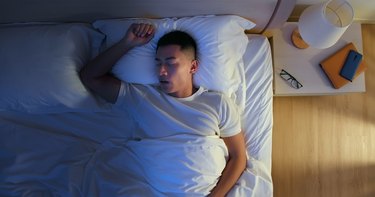
Your head's on the pillow. Your eyelids are getting heavier, and heavier, and heavier...until you're jolted awake by the feeling of being in a total free-fall. While you're still in bed.
What's going on?!
Video of the Day
First, don't panic. That imaginary downward descent isn't a sign that anything is wrong, and most people will experience it from time to time. It's so common, in fact, that sleep experts have a dedicated name for it: hypnagogic hallucinations.
Read on to learn more about that feeling of falling when falling asleep and what causes this and other sleep hallucinations.
So, What Are Hypnagogic Hallucinations?
Feeling like you're falling as you nod off is one type of hypnagogic hallucination, or a brief sensory perception that takes place as you fall asleep.
For a lot of people, hypnagogic hallucinations involve a feeling of falling, flying or weightlessness. Many others have visual hallucinations — often seeing a kaleidoscope-like display of flashing patterns or shapes. Occasionally the hallucinations can even involve hearing noises that aren't there, like people talking or animal sounds. (Creepy!)
The sensation is fleeting, typically lasting just a second or two, and incredibly common: Around 70 percent of people will have at least one hypnagogic hallucination in their life, per the Cleveland Clinic.
And they're nothing to worry about. "It's a normal experience and not a cause for concern if it happens occasionally," says Shelby Harris, PsyD, clinical associate professor of neurology and psychiatry at Albert Einstein College of Medicine and Director of Sleep Health at Sleepopolis.
Hypnagogic hallucinations specifically refer to hallucinations that happen as you're falling asleep. But you can also have similar experiences as you're waking up. Those are called hypnopompic hallucinations.
Hypnagogic Hallucinations vs. Hypnic Jerks
If you've ever felt twitchy or jerky right before nodding off, that's normal too. The phenomenon, called hypnic jerks or sleep starts, are brief muscle jerks that happen as the body transitions from wakefulness to sleep. "They can happen due to muscle relaxation, changes in the brain, stress, irregular sleep patterns or drinking stimulants like caffeine too close to bedtime," Harris says.
Hypnic jerks are different from hypnagogic hallucinations. But they can happen at the same time, per ScienceDirect. Just as you're about to fall asleep, you might get hit with that falling sensation and wake back up with a startling twitch. Some people will also yell out or make a noise.
What Causes a Hypnagogic Hallucination?
Experts don't fully understand why hypnagogic hallucinations occur. Like other types of hallucinations, they seem to happen when the brain is in an altered state of consciousness — like transitioning from being awake to being asleep, according to a July 2021 paper in Comprehensive Psychiatry.
Anyone can have a hypnagogic hallucination, but certain factors seem to make them more likely, including anxiety or mood disorders, insomnia, narcolepsy or drug or alcohol use, per the American Academy of Sleep Medicine (AASM).
Teens, young adults and people assigned female at birth are also more prone to hypnagogic experiences.
Are These Hallucinations Connected to Sleep Paralysis?
Ever had that free-falling sensation while not being able to move your body? Sometimes sleep hallucinations happen alongside sleep paralysis, where you're unable to move or speak for a short period of time as you're falling asleep or waking up, the AASM notes.
The experience can definitely be unsettling, but again, it's fairly typical and not something to worry about unless it's having an effect on your overall sleep quality, Harris says.
How to Stop Hypnagogic Hallucinations
Sleep hallucinations aren't harmful, so you don't need to treat them if they don't bother you. But if they're affecting your ability to snooze soundly, you may be able to reduce the likelihood of them happening.
First and foremost? Try to set the stage for a good night's sleep. Hypnagogic hallucinations are more common when you're falling short on shut-eye or are otherwise stressed, Harris points out. She recommends the following:
- Pick a bedtime and stick to it, to get the recommended seven to nine hours of sleep.
- Establish a quiet, calming bedtime routine to help you relax before it's time to go to sleep and fall asleep faster.
- Avoid screens before bed.
- Avoid caffeine and alcohol before bed.
- Prioritize daily stress-management techniques (like meditation, yoga, journaling or anything that helps you feel calmer).
- Experiment with different sleep positions. For some people, lying a particular way makes them more prone to hallucinations.
When to See a Doctor
You should let your doctor know if sleep hallucinations are having a significant effect on your ability to get a good night's sleep or are causing you to feel tired during the day. In some cases, frequent sleep hallucinations could be a symptom of an underlying sleep disorder like narcolepsy, Harris says.
Let your doctor know, too, if you're having trouble self-managing stress or anxiety that you think might be contributing to your sleep hallucinations, the AASM recommends. A therapist can help you better manage your anxiety, which in turn will help you sleep better.
Is this an emergency? If you are experiencing serious medical symptoms, please see the National Library of Medicine’s list of signs you need emergency medical attention or call 911.

